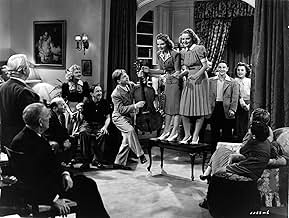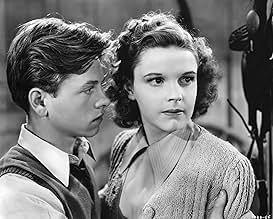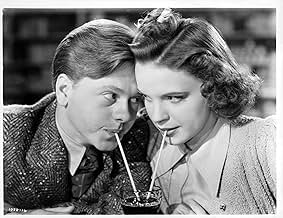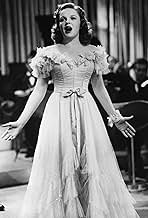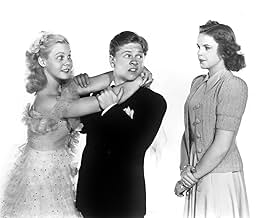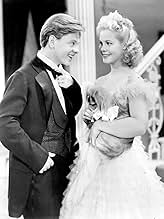Los jóvenes Mickey Moran, músico y cantante, hijo de un artista veterano, y Patsy Barton, una joven cantante, se proponen triunfar en el mundo del espectáculo.Los jóvenes Mickey Moran, músico y cantante, hijo de un artista veterano, y Patsy Barton, una joven cantante, se proponen triunfar en el mundo del espectáculo.Los jóvenes Mickey Moran, músico y cantante, hijo de un artista veterano, y Patsy Barton, una joven cantante, se proponen triunfar en el mundo del espectáculo.
- Dirección
- Guión
- Reparto principal
- Nominado para 2 premios Óscar
- 2 premios y 2 nominaciones en total
- Bobs
- (as John Sheffield)
Reseñas destacadas
What he and Judy do, they do better than anyone else, put on a show. In fact in this case the 'put on a show' gambit did originate in the original Broadway Musical. Babes in Arms was one of Richard Rodgers and Lorenz Hart's best shows it ran for 289 performances in the 1937 season and boasted such Rodgers&Hart classics as Johnny One Note, Way Out West, My Funny Valentine, I Wish I Were in Love Again all of which were discarded for the film. The Lady is a Tramp is only heard instrumentally, my guess is the Code frowned on that lyric. The title song and Where or When are retained. In fact when you come right down to it, only the basic idea the songs mentioned and a couple characters names came over from Broadway.
Still Nacio Herb Brown and Arthur Freed wrote Good Morning which is better known from Singin' in the Rain, but it was Judy and Mickey who introduced it here. And a whole lot of other Brown&Freed songs from MGM musicals got interpolated into the score.
Douglas MacPhail and Betty Jaynes who were introduced in Sweethearts also are here and sing beautifully. They married, but the marriage and MacPhail's career fell apart and he committed suicide a few years later. He had a great baritone voice, what a shame. The following year he introduced my favorite Cole Porter song, I Concentrate On You in The Broadway Melody of 1940.
This was the film Judy Garland did right after The Wizard of Oz and coming along right with her is Margaret Hamilton playing another Miss Gulch like character. One of those spinster ladies who forever pry into other people's business.
Believe it or not there was still a lot of prejudice against theatrical people even in 1937. A lot of old vaudeville types like Charles Winninger, Rooney's father in the film, settle in the town of Seaport on Long Island and their presence apparently upsets the ruling families like Hamilton's. When times go bad and vaudeville goes to seed, things get kind of rough for them. The old timers try to take a last tour to raise some money, but instead it's the kids who are up to the latest trends in pop music who save the day.
Guy Kibbee is in this also, playing against type as a wise and sympathetic judge, usually the parts MGM reserved for Lewis Stone or Lionel Barrymore. A more typical Kibbee type would be the oafish tycoon in 42nd Street, but he's fine here.
Possibly director Busby Berkeley wanted Kibbee, maybe as a good luck charm from that other breakthrough musical of his from his days at Warner Brothers. Of course the musical numbers in the show are set with the usual Berkeley surrealism, a little tempered though from his high flying days at Warner Brothers. That same year Berkeley had done a surreal type number in the Jeanette MacDonald-Lew Ayres film Broadway Serenade and it laid an egg. Someone at MGM must have reined him in.
Babes In Arms retains all its charms from 1939 mainly because Mickey Rooney is infectious and Judy Garland's singing is eternal.
On the other hand, is it really possible that the manic Mickey Rooney was only 19 when he made this? He really shows why he may be the single most talented American performer of the last century. He dances, he sings, he does drama, he does comedy, and he has incredible control over his every move and muscle. And he does unbelievable and hilarious impressions of Clark Gable and Lionel Barrymore. And Franklin Roosevelt.
A few quick notes: June Priesser, who plays "Baby" Rosalie, was a terrible actress. But watch out for her stomach-churning contortionist back-rolls when she first comes out on a stage.
The child actor who plays Mickey Rooney at age 5 dancing on a Vaudeville stage for a few moments early on really does look like Mickey Rooney!
I think Judy Garland actually has some of the same lines in this movie as she does in "Wizard of Oz", done in this same year. Watch out for when Mickey Rooney feints early in the film; Garland reacts to this exactly, and I mean exactly, as she does in Oz when the Lion feints. Eerie!
When Judy Garland, as Eleanor Roosevelt, sings "My day, my day", she is referring to an actual long-running newspaper column written by E.R. from 1936 to 1962.
Finally, the final song and dance number is the most mind-numbing, over-the-top tribute to America, dancing, how we are not Nazis, American Indians, Asian Indians, dancing, the Roosevelts, and dancing, that I have ever seen. Yes, it was early WWII, but still, you wonder if anyone even in 1939 thought this was a little too much?
Recommended for its high energy, its Rooney and Garland, its more Rooney, its offensiveness, and its too much of everything. It is history, and should be watched by all.
Though, one cannot approach a film like this with more than a hint of cynicism: Busby Berkeley is arguably the greatest choreographer in the history of film, and though he does not show off the spectacle of his earlier films, like Gold Diggers of 1933 and Gold Diggers of 1935 (which he did not direct), his dance numbers are interesting (for instance, when the town's teenagers partake in a book-burning, throwing into the flames symbols of conformity). The film is sweet, fresh, and bright, and, as the first Arthur Freed musical, serves as one of his better (though certainly not his best).
In all, I give it a 3 out of 4 stars (***).
On a side note, three of the songs that appear in Singing in the Rain appear in this film, predating the Gene Kelly musical by over 15 years: Good Morning, Good Morning, Singing in the Rain (which appears in a montage showing previous MGM musicals), and You Are My Lucky Star.
¿Sabías que...?
- CuriosidadesMGM Studio's biggest money grosser of 1939, surpassing El mago de Oz (1939) for that production year.
- PifiasDuring the girls' duet, Patsy Barton begins her solo, and Mickey Moran switches from cello plucking to piano thumping. However, the music continues as it was before, and we don't hear any amazing sounds on the piano in spite of Mickey's efforts.
- Citas
Rosalie Essex: How much do you need?
Mickey Moran: Well, let me see. First of all, we're going to use a barn that some actors used last summer and turned it into an outdoor theater. I figured if we all pitched in together - that is, for the scenery and the costumes and everything - it would run us about $287.
Rosalie Essex: Have you got it yet?
Mickey Moran: No.
Rosalie Essex: Well, you have now.
- Versiones alternativasOlder TV prints (and early video releases) of "Babes In Arms" run 91 minutes, and exclude the "My Day" segment of the finale, with Mickey Rooney and Judy Garland spoofing Franklin and Eleanor Roosevelt. This segment was deleted for a 1948 reissue. "My Day" was restored in the 1990's by Ted Turner, and is included in current prints.
- ConexionesEdited into Hollywood: The Dream Factory (1972)
- Banda sonoraBabes in Arms
(1937)
Music by Richard Rodgers
Lyrics by Lorenz Hart
Played during the opening credits
Sung by Douglas McPhail (uncredited), Mickey Rooney (uncredited), Judy Garland (uncredited) and chorus
Selecciones populares
- How long is Babes in Arms?Con tecnología de Alexa
- Impersonations?
Detalles
Taquilla
- Presupuesto
- 748.000 US$ (estimación)
- Duración1 hora 34 minutos
- Color
- Relación de aspecto
- 1.37 : 1
Contribuir a esta página



